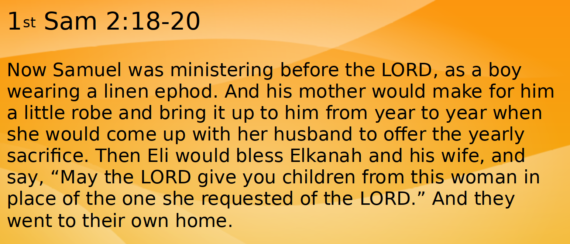By Seth Maus
The story of Hannah in 1st Samuel is one of the most powerful examples of parental love in scripture. Hannah was barren and unable to have children; a source of great grief for her. When we first meet her in chapter one of 1st Samuel, we find Hannah pleading with God to give her a son. And so great is her desire, she vows that, should God bless her with a boy, she will devote him forever to the service of the Lord. That is a solemn prayer, the kind a desperate person may say idly in an hour of sorrow, yet not really mean when the sadness has passed.
But Hannah meant every word. When God does answer her and Hannah conceives Samuel, the vow is kept, and as soon as Samuel is weaned, he is brought to the temple to begin his service. Samuel, of course, is a major character in the history of Israel – his oversight guides the forming of the kingdom, the coronation of Saul (and removal of that crown), and eventually, the establishment of David and his dynasty. From a storytelling perspective, Samuel is the important character, so the tale should shift from Hannah to her son as soon as he is born.




However, the story doesn’t shift – not quite yet. Hannah still has a part – a significant part, though easily overlooked. In chapter two of 1st Samuel, after Hannah has sung a wonderful song of thankfulness to God, we read this:
“18 Samuel was ministering before the LORD, a boy clothed with a linen ephod. 19 And his mother used to make for him a little robe and take it to him each year when she went up with her husband to offer the yearly sacrifice.” (1 Samuel 2:18-19) It is such a small thing, this brief mention of an act of love by a mother, yet God considered it important enough to remain part of scripture. Why?
Perhaps God wanted us to consider the cost of Hannah’s vow. How much grief do you think those little robes caused her? How heavy was her heart as she handed those robes to her son, whom she saw but once a year? How many tears were shed as she waved goodbye when they left the temple? The weight of her vow must have been unbearably heavy, yet Hannah continued bringing her son this small show of love and support every year, bringing this little robe.
But perhaps God wants us to consider not only the cost but the wonderful reward of Hannah’s commitment. How encouraged must young Samuel have been, seeing his mother each year, little robe in hand? This little boy, who one day would have two whole Biblical books named after him, was being wrapped not merely in cloth but in love. And more, those little robes confirmed to Samuel that he belonged to God, and mom would always support that calling. With a committed mother behind him, Samuel would become a household name in Israel; more importantly, Samuel would become a mighty vessel for God to use.
Not all of us within the church are blessed to be parents in a natural sense, but I think every Christian can take up Hannah’s spirit. Churches worldwide are full of children who want to serve God and are called to be part of God’s family. Yet, often, they are pushed aside because of their age. We should be different. We, like Hannah, should remind those children that they belong to God and supply them with the little robes they need.

